Project status end of December 2012
Outline of the project in 2008
The point of departure of this project is the experienced need for new world history. However, such a new world history must be something other than just an updated version of the conventional Western narrative with a starting point and a goal, where everything is measured in terms of backwardness and progress. The most recent example in this vein is the globalisation narrative since the early 1990s. A new world history must integrate perspectives formulated in academic discourses in non-Western cultures. One must understand this point of departure against the backdrop of the fast erosion of the neoliberal globalization narrative’s capacity to convince in the wake of the Lehman Brothers’ Big Bang collapse. in 2008, and the experienced risk of a da capo of the nationalist reaction to the great depression after the system collapse in 1929. The (meta)normative interest is in a global perspective but different from neoliberal globalization. The interest is in a global post-European conceptualisation of the social and the economic with contributions from Asian and African languages.
The project’s target is the conceptualisations and imaginations of the social and the economic in various European, Asian and African languages. The semantics of these two spheres are conventionally departing from Western conceptualisations with an origin in the Antique World. This Western provenience is arguably problematic in a global world without a Western centre. Conversely, we cannot easily do away with this fact. Our solution is to explore the translations of the semantics around the social and the economic to and from various Asian and African languages. Therefore, the crucial question is what native etymological resources the translations draw upon. We want to establish a transnational epistemological horizon towards which European, Asian and African conceptualisations of the social and the economic are related equally.
The horizon we want to establish is not one where the Asian or African conceptualisations are played off against the European but one where European, Asian and African semantics are entangled in historical processes. A frequent argument in the postcolonial critique deals with a continuous Eurocentric agenda and that, therefore, full autonomy must be based on the interruption of communication under the development of indigenous discourse. The project wants to challenge this argument and search for possibilities of a non-Eurocentric transcultural dialogue. However, one must underline that the arguments for rupture are not unchallenged. Recent approaches in postcolonial studies emphasise entanglement rather than rupture (Majumdar 2010). The project wants to connect to and contribute to this debate between rupture and entanglement.
Organisation
The project was initiated by Bo Stråth at Helsinki University. It is organised as a consortium of researchers at European, Asian, African and American universities. In Helsinki, the project began as a prestudy within the framework of a seminar series in the autumn of 2007 and the spring of 2008 under the title of Conceptual History and Global Translations. At this stage, the project became a joint venture with Hagen Schulz-Forberg at Århus University. They were about to finish a book they had begun to work on at the EUI with a critical assessment of the European integration project, The Political History of European Integration. During this work, the insight grew that the question of a European political economy, as opposed to a radical market economy, needed to be seen much more from a global perspective. It was also clear that the problem should be approached through a focus on the conceptualisation of the social and the economic, a conceptualisation including Asian and African language cultures. A conference was prepared at a meeting in Skagen in June, and a seminar in Helsinki in August. It was held in Helsinki in October 2008 with European and Asian conceptual historians and historians who wanted to learn more about conceptual history as an approach to Eurasian history. The contrast to the neoliberal globalization narrative was clear. The bankruptcy of Lehman Brothers in September sent shock waves over the world and was water on the mill at the conference a month later.
Brainstorming global translations meeting in Helsinki October 2008
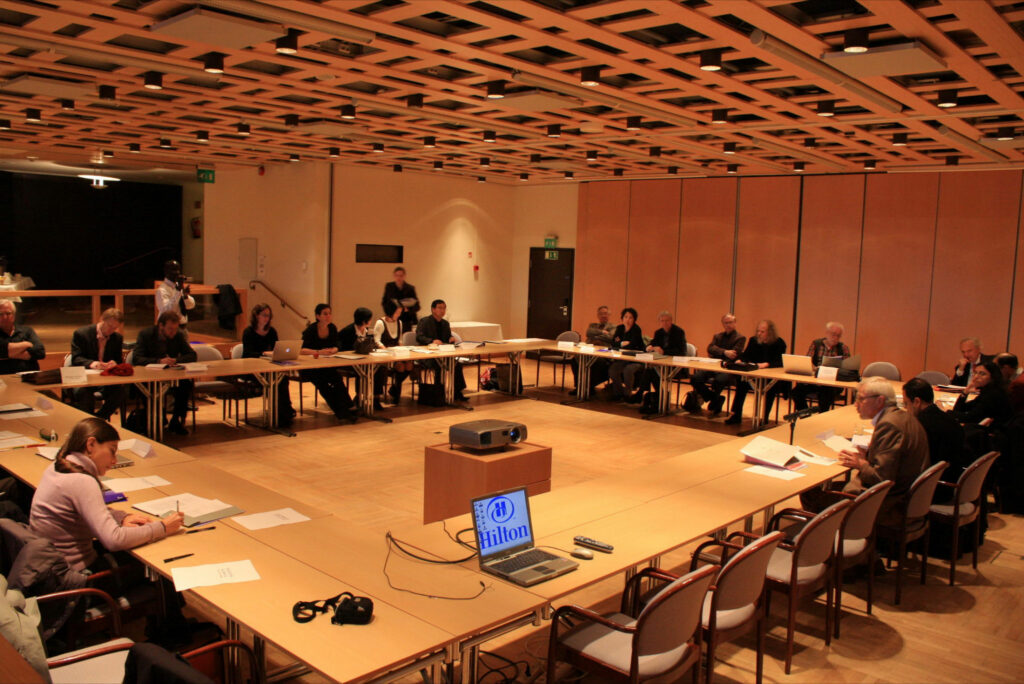
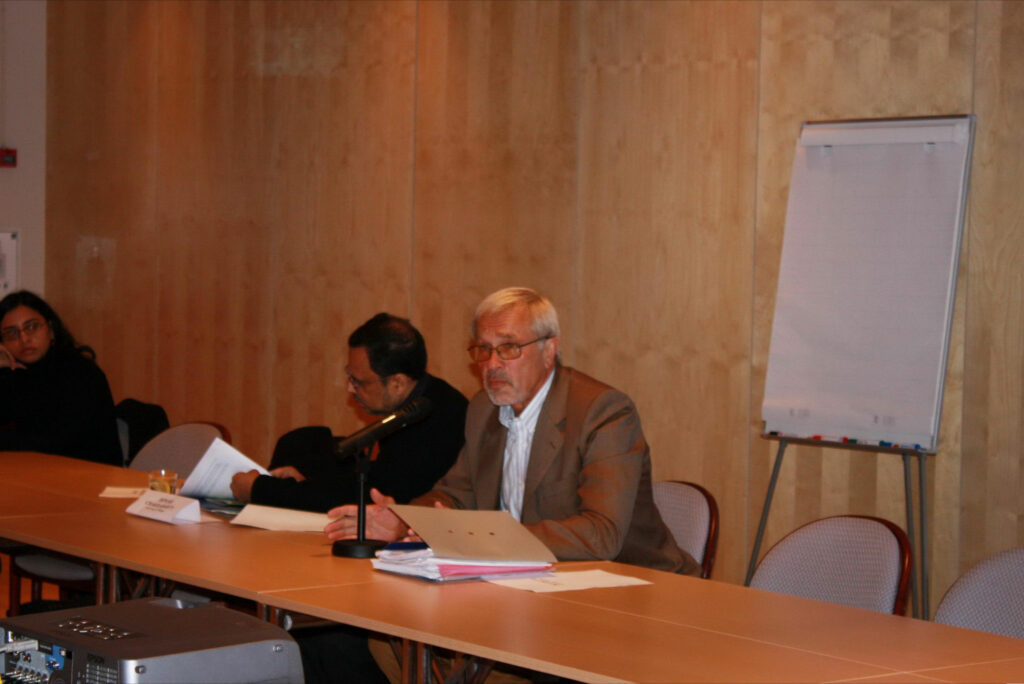
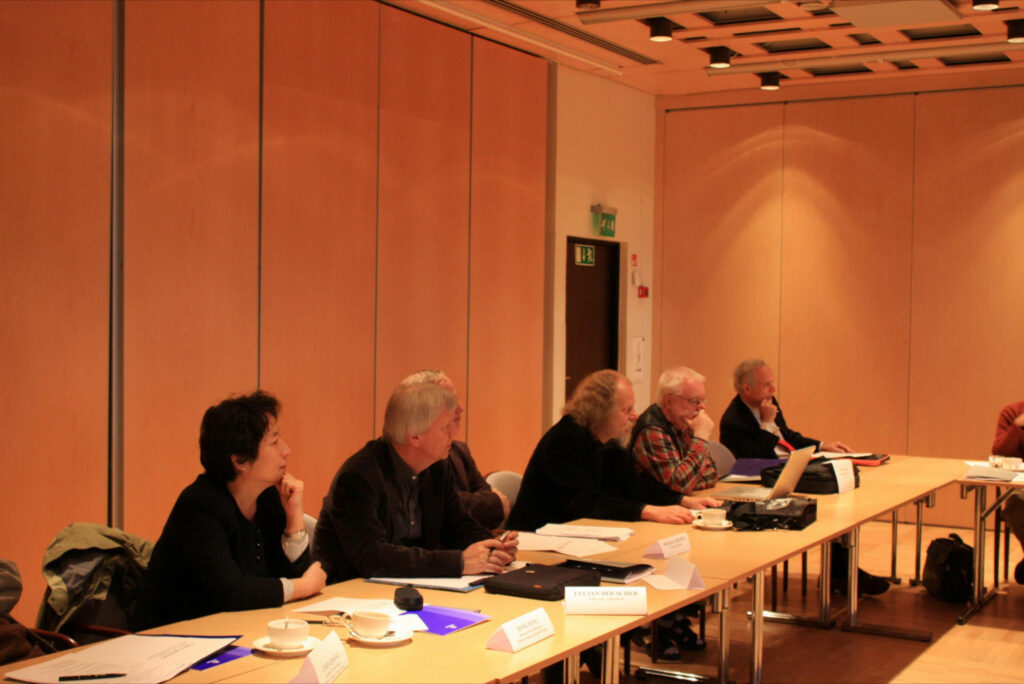
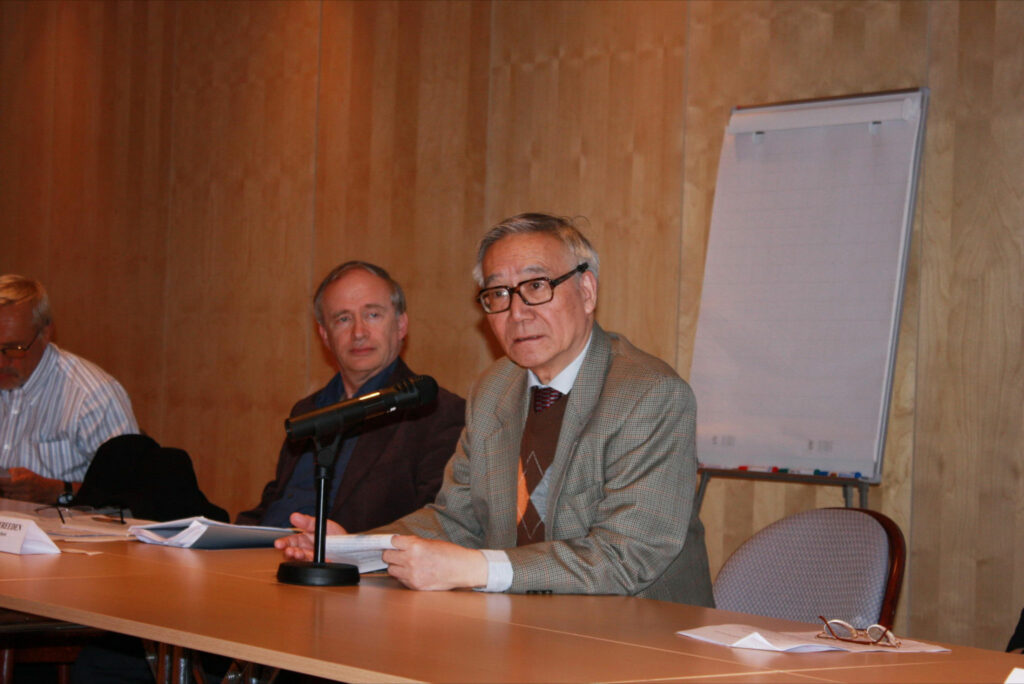
A second workshop was held in March 2009 at the Srinakharinwirot University in Bangkok, sponsored by the KONE Foundation and the Asia-Europe Foundation (ASEF) and a third in October 2009 in Berlin, sponsored by the Max-Planck-Institut für Bildungsforschung and Århus University. A fourth workshop was held in Damascus in March 2010, sponsored by the KONE Foundation. The research until then focused on the Asian conceptualization of the social. A volume on the Asian conceptualisation of the social is in preparation (Morakot Jewachinda Meyer and Hagen Schulz-Forberg (eds), Appropriating the Social and the Economical: Asian Translations, Conceptualisations and Mobilisations of Core European Concepts from the 1860s to the 1940s forthcoming).
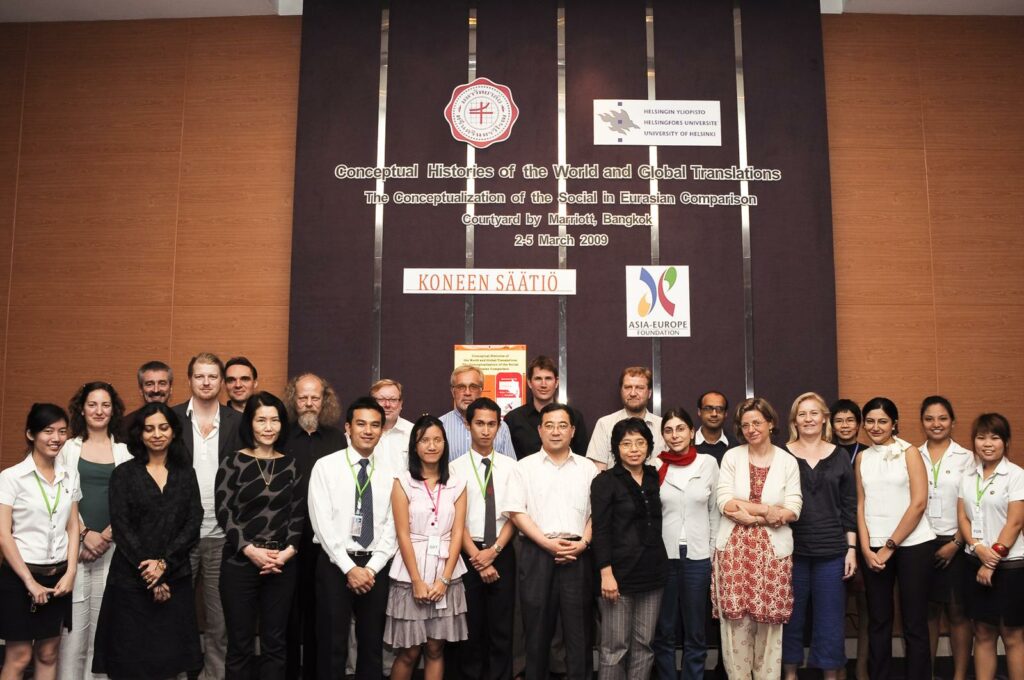
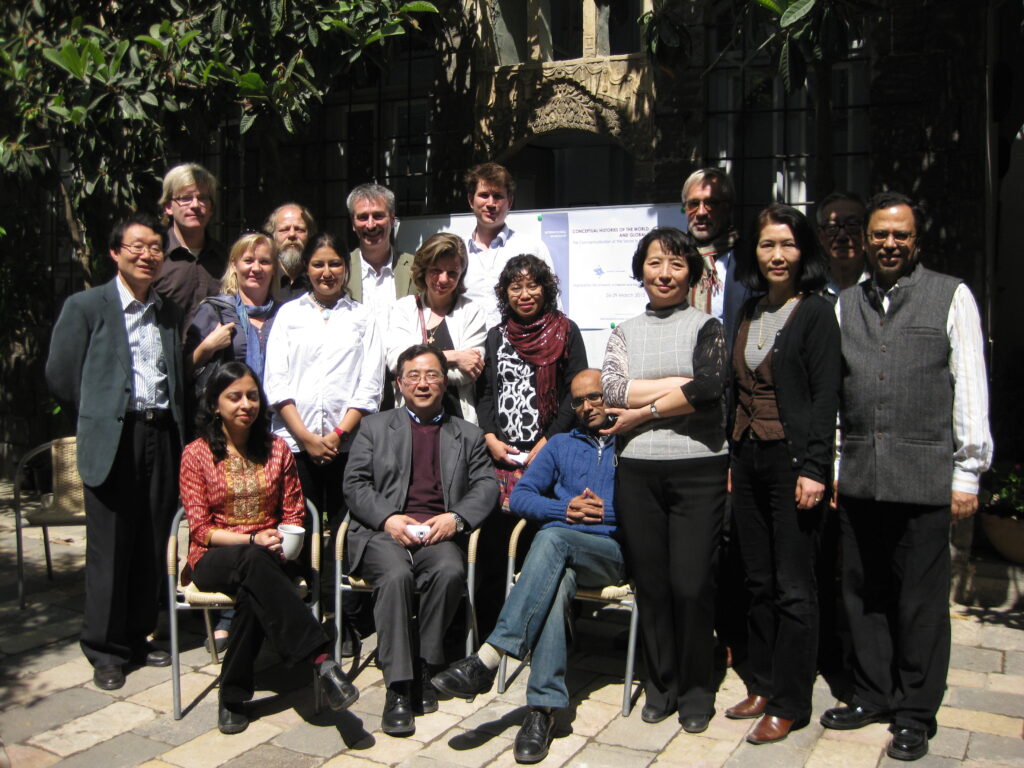
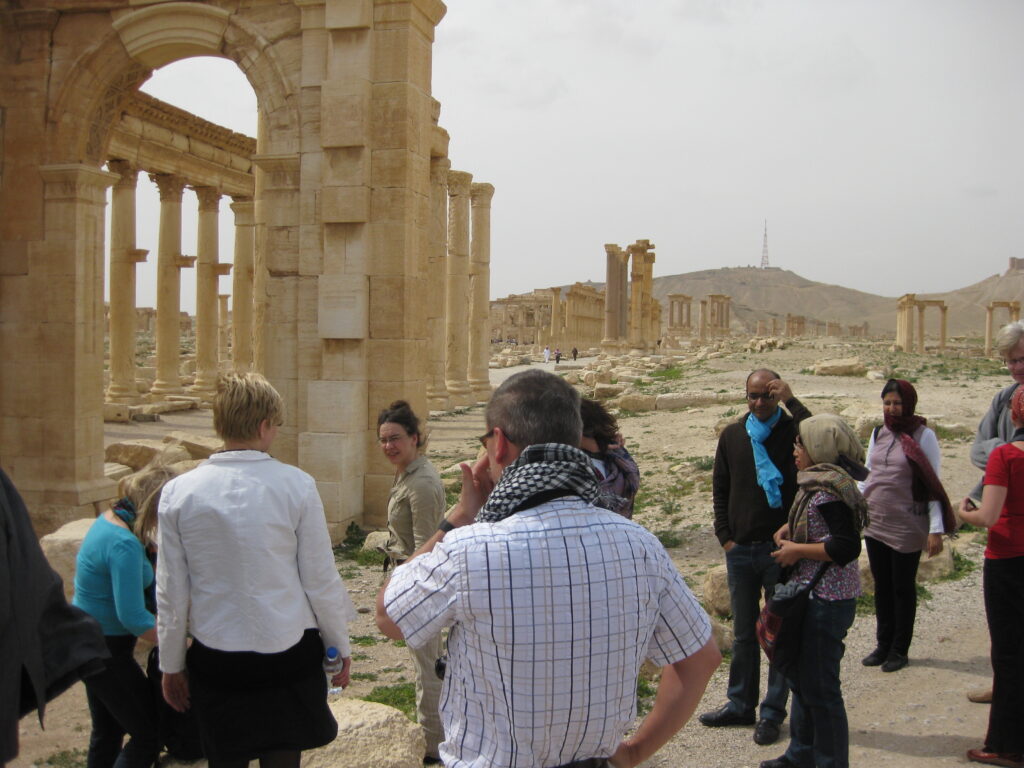
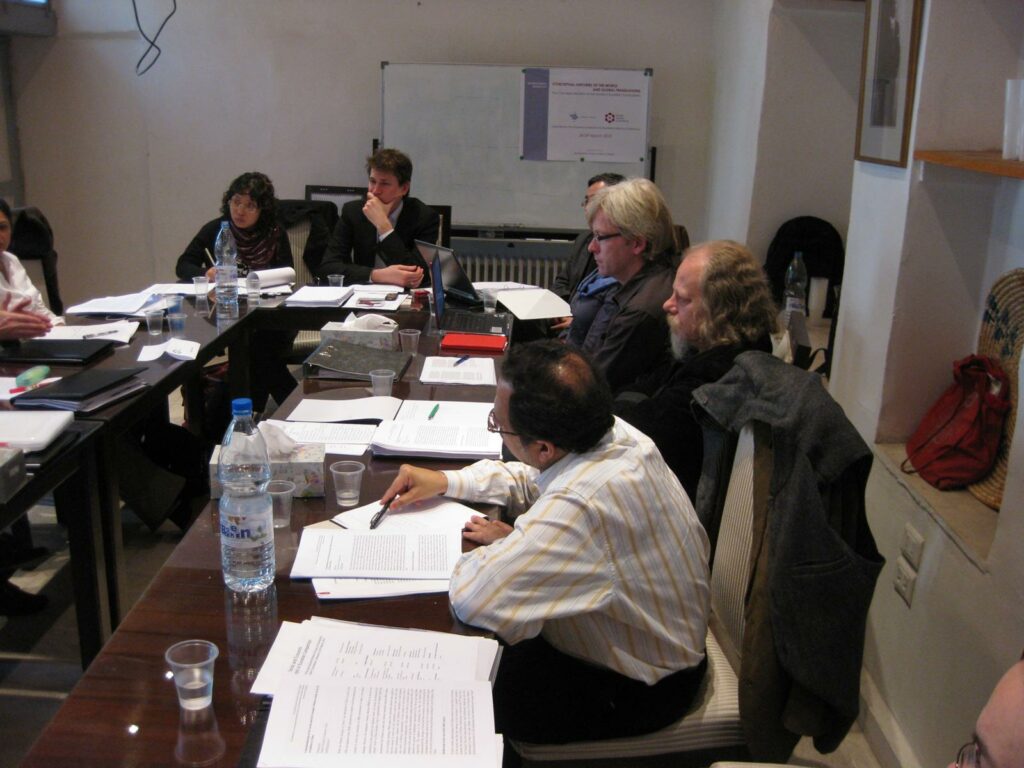
In February 2010, the first workshop was organised with a parallel research team on conceptualising the social and economic in African languages. In Helsinki, Axel Fleisch, a linguistics professor focusing on African languages at the university, came on board. This part of the project was called Conceptafrica. The meeting, sponsored by The Bank of Sweden Tercentenary Fund, was held in Stellenbosch, South Africa, in cooperation with the Stellenbosch Institute for Advanced Studies. The African team then met in Helsinki in May 2011 Programme (pdf). The Concepta programme at Helsinki University (Dept of World Cultures/CENS) sponsored the meeting. A third meeting was held at Glensbury Lodge outside Johannesburg in November 2012.
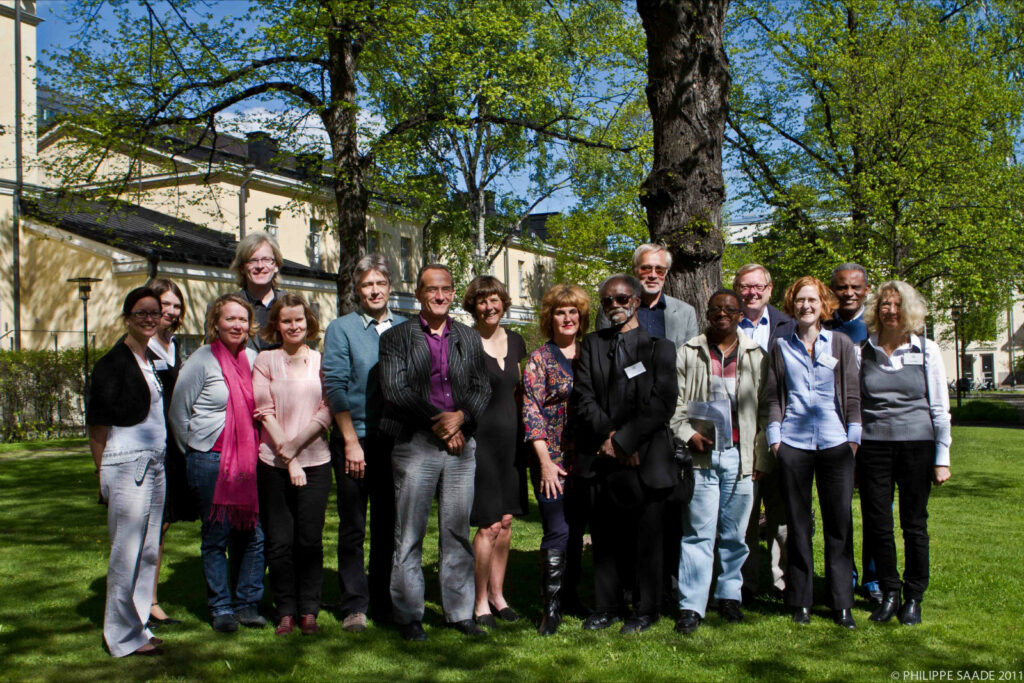
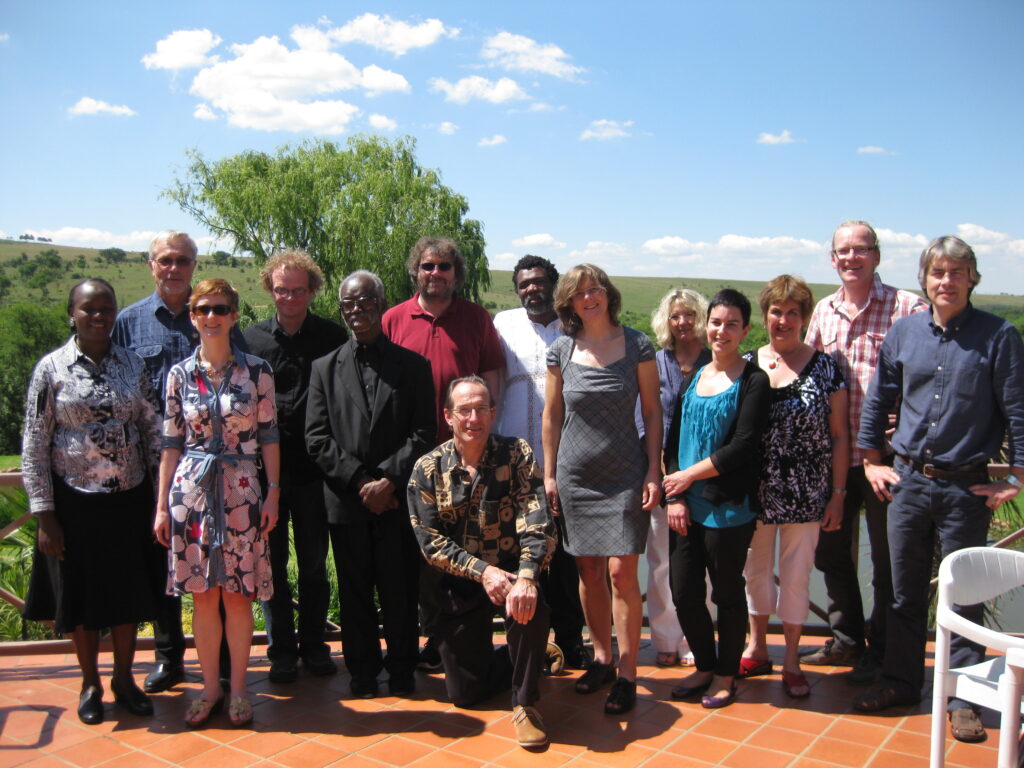
Method and Theory
Is it then possible to compare concepts in various languages? Something is lost in every translation. Reinhart Koselleck argued that comparing concepts would require a kind of neutral metalanguage (Koselleck 1991). He referred to the citizen example. If one translates the French citoyen into German, the term is Staatsbürger. However, according to Koselleck, these two concepts cannot be compared because they represent two very different histories. One could add on citizen and argue that citizen has a different history than citoyen and Staatsbürger. If we add the corresponding terms in the Scandinavian and Finnish languages – medborgare and kansalainen – the complexity increases even more. Medborgare means co-citizen and connotes a link to the bürgerliche civil society, whereas kansalainen is derived from a link to the state concept. However, one should not exaggerate these inter-Nordic differences since society and state are very closely related, almost synonymous concepts. The prefix civil was added to society in the Scandinavian languages only during the incorporation of the neo-liberal language in the 1980s and was used to create the demarcation between state and society that was missing and bring society closer to the market concept. To this collection of European examples, one could add the comparison of Volk in German and folk in Scandinavian languages, peuple in French, populus in Italian, demos in Greek, kansa in Finnish, or folk or people in English and many other languages. They all represent very different realities and histories.
However, is Koselleck’s resignation in front of an impossible undertaking necessary? Could not the disadvantage be turned into an advantage? Is not exactly the different histories represented by the different concepts the source of a rich historical understanding based on the comparison of differences?
The project assumes that this is the case. The comparison is not only between concepts but also between histories. And the utmost aim is not the concepts per se in a kind of lexicographic approach but to discern the different histories the languages convey through an analytical focus on the key concepts and their counter-concepts and semantic fields. The research target is historical dynamics. Since there is no exact translation, the goal can only be approximate interpretations and converging understandings of differences.
Conceptual history, as outlined by Reinhart Koselleck, departs from the understanding that politics in democratic societies or in societies with a minimum of public debate require shared concepts and at the same time, disagreement about the meaning of these concepts. The shared conceptualisation provides the arena of the political struggle, and the attempts to appropriate positions of interpretative power of the key concepts constitute the political process. Since history with the enlightenment philosophy and the French revolution got a direction and imaginations of a different past and a future that can become different through human agency, the core of the conceptual struggle has dealt with interpreting experiences and translating experiences into expectations. The constant tension between social critique and political crisis underpinned the search for political positions between experiences and expectations (Koselleck 1988).
There is a clear link from this approach of Koselleck to Michael Freeden’s approach to politics and ideologies with an emphasis on the conceptual, where ideologies, rather than being long-term consistent and separated chains of thought, are seen as depositories or arsenals of arguments which can be collected and combined in various ways from various ideological origins contingent on the specific historical situations (Freeden 1996, 2005). Historical processes and politics are open and contingent; nothing is predetermined in its formulation. This focus on the conceptual struggle and the mutating shifts of the meaning of key terms in crucial historical moments, and the introduction of new concepts of different provenance, provide the project’s methodological approach. Our conceptual methodology also clearly connects to the Cambridge speech act school, with Quentin Skinner as the protagonist. They began to rewrite the history of Western political thought by reconstructing the precise context and meanings of words and ideas in the past and showing how they had changed their shape and connotations over time, like chameleons, to adapt to new circumstances and new deeds (Skinner 1978, 1998 and 2008).
In the vein of Koselleck, Skinner and Freeden, we are not only interested in concepts as single constructs but as crucially informed by their proximity to other concepts at different points of time and space. Concepts develop counter-concepts in semantic fields. The combination of, for instance, liberty, private property and personal initiative means something different than when liberty is connected to human welfare and social development, to use an example from a Western vocabulary.
A comparison of the conceptual situations or moments diachronically or synchronically will result in an understanding of continuities and discontinuities and translation dynamics. What are the relationships between translated concepts, and to what extent are they inscribed in similar semantic fields and metaphoric languages? From what metaphoric fields are key concepts derived in, for instance, the social and economic fields? Biologic or mechanic metaphors, for instance? In what periods have conceptual shifts and mutations occurred, and to what extent and how have they been translated? What are the sequences in a comparative perspective? What transfer of words and meanings occurs under the development of what counter concepts and relationships between symmetric and asymmetric concepts? Such and similar questions in a comparative perspective can show how concepts mutate with and travel between metaphoric languages and semantic fields. What similarities and differences in terms of interpretations of experiences and outlines of expectations are there between various cultures? What are the differences and similarities in styles of politics?
Reinhart Koselleck remarked on the impossibility of comparison across languages without a meta-language before the acceleration of a European academic network community in social sciences began. One can and should have many critical comments on the EU-financed research projects in social sciences, but one good thing they have in common. They have intensified communication across language borders and increased the mutual understanding of differences. Through rich comparisons in trans-European research projects, the academics know that citoyen is not Staatsbürger and know a lot about why it is so. The growing insight of difference and the attempts to develop a language to describe the differences and approximations has brought new important historical knowledge.
However, the aim of world history is much more complex than European history based on a comparison of the conceptualisation of society. The social, economic, political, democracy, progress, development, modernity, tradition, religion, civil, civilisation, culture, empire, and so on are all Western concepts. Although their translation between the European languages shows important differences, they are much more narrow to each other than to Chinese, Japanese, Indian and African languages, for instance. There is a Western bias in the conceptualisation of social life.
The challenge of the project on a new comparative conceptual world history under the keyword of “global translation” is searching for positive answers to Koselleck’s problem of comparability and translation but at an even more complicated level regarding linguistic differences. The problem in going beyond Europe is that, despite the European diversity, our conceptualisation of the political, the economic, the social, the religious, and so on, and the semantic fields, which this conceptualisation has built up, in many respects rely on a Greek and Roman origin, and this reliance makes communication across the diversity relatively easier than when we move beyond Europe. How are Western concepts like civilisation, culture, democracy, community, union, class, religion, salvation, utopia, and so on translated into Chinese, Indian, Swahili or other languages? Is the communication only a monologue of Western values, or is there a potential for developing a more dialogical reflection on similarities and differences? Can the European experience of Europeanisation of understanding the differences (between e g citoyen and Staatsbürger) also be used and adopted globally? The challenge of this project is to answer these questions affirmatively.
The crucial question is how much the European or Western view can be relativised. Dipesh Chakrabarty, in his postcolonial critique, confronts that question (Chakrabarty 2001). Although he recognises the Enlightenment values as a European achievement for the world and that no Indian history can be written without integrating the colonial experience, in Provincialising Europe, he critically asks what the implications are for the former colonies and discusses what can be done. It is easy to agree with Chakrabarty’s view that colonialism produced a world image where it became “normal” to think of England as a rich country and India as a poor country. His argument that he and other historians of Asia and Africa must pay attention to the academic production of their European colleagues, who must not consider the scholarly production in Asia and Africa, is a serious critique. The challenge is to develop this kind of communication.
A crucial problem in any world history is the issue of Eurocentrism. Arif Dirlik, for instance, has argued that world historical outlooks need to be understood as privileged, centric perspectives of the past (Dirik 2002, 2003). One could add that the purported desire to develop multi-angled world historical versions cannot overcome this situation since Eurocentrism can be described as inclusiveness rather than exclusiveness, expansive inclusion. According to Dirlik, fitting different societies or regions into an overarching narrative is impossible without ranking and filing them according to allegedly universal standards. For example, world histories tend to operate with Western categories such as “nation”, “culture”, or “civilisation”, which are implicitly or explicitly presented as the subjects and not the products of history.
As opposed to such views, Jerry Benley has argued that historians can transcend their original limitations and that rather than being a static set of world visions, their construction fields are dynamic and open with a potential for self-correction (Benley 2003). This argument comes close to the European experience of growing approximation in understanding the differences among European languages just referred to. However, This statement still has to be filled with substance. The gap to bridge is much bigger between the European and the non-European languages. However, this means that the problem is practical and empirical rather than principal and theoretical.
How are genuinely Western metaphorical fields around conceptualisations of the political, the economic, the social, the religious, etc, translated into non-Western languages? What domestic linguistic linkages are there? What etymologies? These are the crucial questions that must be addressed. World in world history must not necessarily be understood as a Hegelian nexus requiring totalising narratives but should rather be seen as an open research field that encourages the pursuit of trans-local themes as much as comparison of nations and civilisations. Solutions should be looked for in ecumenical research in social sciences. New kinds of world scholarship are needed, which are more dialogical and can only be conceivable if new structures and patterns within the global academic landscape are developed. At the moment, world historians, for instance, theorise a lot about trans-cultural spaces, but in their academic practices and communities, national (or European) boundaries and public spheres remain the main point of reference. From a long-term perspective, ecumenical world history is only conceivable within a more ecumenical scholarly community. This, in turn, requires more reflection on the global sociology of academic knowledge production (Sachsenmaier 2007). Lynn Hunt has argued that, at least for the US, the fervour of methodological debates has started to fade away (Hunt 2002). However, in future, it might well be, according to her, that world history or trans-cultural history will experience more disputes between rival research approaches, political positions and overall world views than conventional historiography centred on the national frameworks. The exploration of spaces beyond nation-states makes it urgent to reconsider the structures and guiding principles of historiography critically. Nationally organised scholarly communities may be ill-equipped to handle transnational or global research geographies. The question of whose world history, perspectives and historiographical traditions are being applied will become more pertinent than in the case of more localised research orientations. World historians will hardly be able to distance themselves from intellectual and political questions that may be understood as the great themes of global civil society in the offing. There will be a need to debate the value orders, experience bases and traditions underlying historical research and narratives globally. The calls for multi-perspectivity and ecumenical narratives certainly point in that direction, although behind these keywords are very complex realities.
The conceptualisation of the social and the economic. The concentration is thereby on the social. The implicit normative aim is to contribute to an alternative narrative to the reductionist economistic globalisation ideology, an alternative that concentrates on the social entanglements of the world, for instance, the interlacing produced by social protest.
Nobody has more convincingly argued for the global intertwining from the social point of departure than Etienne Balibar. What truly has unified the planet is, in his view, not just colonial expansion but the revolts, the liberation struggles that put into question the notion of ‘different natures’ that separate peoples of the ‘metropolis’ from those of the colonies, producing a dialectic between these two demographic groups that results in a reversal of roles, a ‘particularising’ of the old metropolis and a ‘universalisation’ of the former colonies (See, for instance, Balibar 2003 and 2004).
In the Western tradition, the Western concepts we depart from and their semantic fields are conventionally analysed along two parallel tracks representing two different academic disciplines, sociology and economics. We want to study the concepts in their inter-dynamic entanglements, however.
The horizon of a new kind of encompassing non-Western world history indicates, rather than one world history in singular, new world histories in plural written from the perspective of a cross-cultural comparison of the conceptualisation of social life in key areas of political activity. The possibility of communication across cultural and civilisational borders is at the centre of such an enterprise.
References
Balibar, Etienne (2003). Europe: An ‘Unimagined’ Frontier of Democracy. Diacritics, 33.
Balibar, Etienne (2004) We, The People of Europe? Reflections on Transnational Community, Princeton, N J Princeton U P.
Bentley, Jerry H. (2003). “World History and Grand Narrative.” In Writing World History, 1800-2000, ed. Eckhardt and Stuchtey Fuchs, Benedikt. Oxford: Oxford U P.
Chakrabarty, Dipesh. (2001). Provincialising Europe. Postcolonial Thought and Historical Difference. Princeton: Princeton U P.
Dirik, Arif. (2002). “History without a Center? Reflections on Eurocentrism.” In Across Cultural Borders: Historiography in Global Perspective, ed. Eckhardt and Stuchtey Fuchs, Benedikt. Lanham, Md; Oxford Rowman&Littlefield.
Dirik, Arif. (2003). “Confounding Metaphors, Inventions of the World: What is World History For?” In Writing World History, 1800-2000, ed. Eckhardt and Stuchtey Fuchs, Benedikt. Oxford: Oxford U P.
Freeden, Michael. (1996). Ideologies and Political Theory: A Conceptual Approach. Oxford: Clarendon Press.
Freeden, Michael. (2005). Liberal Languages. Princeton: NJ: Princeton UP.
Hunt, Lynn. (2002). “Where have all the theories gone?” Perspectives March.
Koselleck, Reinhart. (1988). Critique and Crisis: Enlightenment and the Pathogenesis of Modern Society. Oxford: Berg.
Koselleck, Reinhart. (1991). “Drei bürgerliche Welten? Zur vergleichenden Semantik der bürgerlichen Gesellschaft in Deutschland, England und Frankreich.” In Bürger in der Gesellschaft der Neuzeit. Wirtschaft-Politik-Kultur, ed. Hans-Jürgen Puhle. Göttingen: V&R.
Majumdar, Rochona. (2010). Writing Postcolonial History. London and New York, Bloomsbury Academic.
Sachsenmaier, Dominic. (2007). “World History as Ecumenical History?” Journal of World History 18(4):465-489.
Skinner, Quentin (1978), The Foundations of Modern Political Thought. Cambridge: Cambridge UP
Skinner, Quentin (1998, Liberty before Liberalism. Cambridge: Cambridge U P 1998.
Skinner, Quentin (2008) ” A Genealogy of the Modern State”. British Academy Lecture 13 May 2008. Published in Proceedings of the British Academy 162 2009 pp 325-370.





































